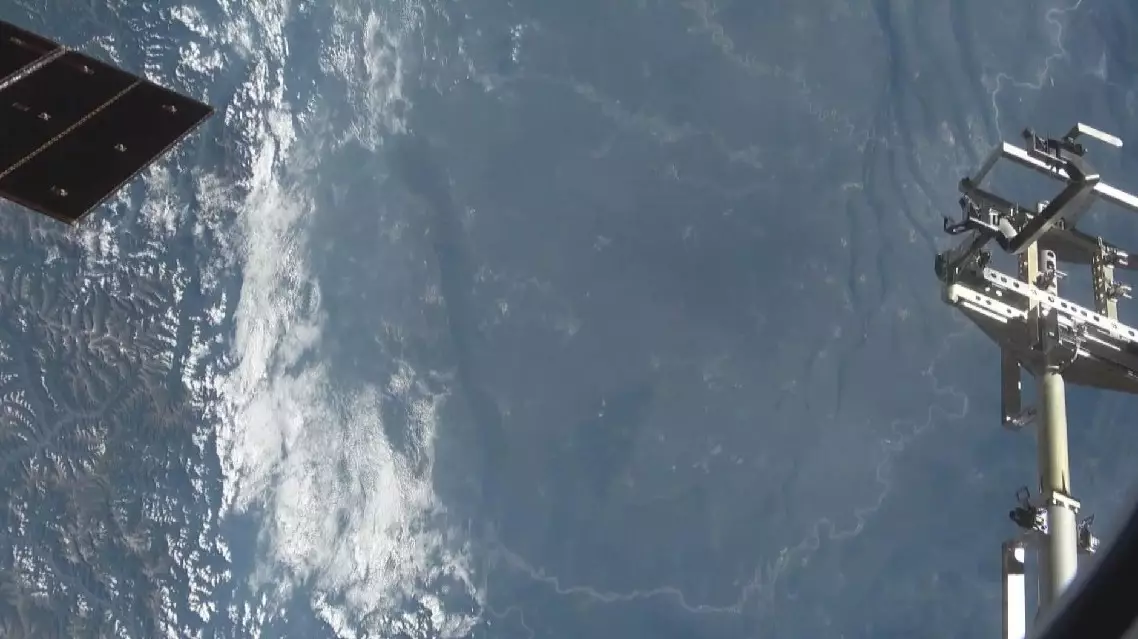The Shenzhou-18 crew members on board China's orbiting space station Tiangong recently shared their views from space of the Yangtze River and the Yellow River, regarded as the two "mother rivers" of the Chinese nation.
Ye Guangfu, commander of the Shenzhou-18 crewed spaceflight mission, first shared the views of the Yangtze River, China's longest waterway and the world's third-longest river, sustaining a number of the country's economic powerhouses, megacities and major rice-producing areas. Along the basin of the Yangtze, many famous cities are situated, including Chongqing in southwest China, Wuhan in central China, and Nanjing and the Chinese financial hub of Shanghai in the east.
The Yangtze River Economic Belt along the golden waterway covers nine provinces and two municipalities, accounting for more than 40 percent of the country's population and economic aggregate. In recent years, China has strengthened joint environmental protection along the river to conserve biodiversity.
Li Cong, another astronaut of the Shenzhou-18 crew, then shared the views of the Yellow River, China's second-longest river. Originating in northwest China's Qinghai Province, the Yellow River, known as the cradle of Chinese civilization, runs through nine provincial-level regions including Shaanxi and Henan before emptying into the Bohai Sea in east China's Shandong Province.
As an "ecological corridor," the Yellow River, linking the Qinghai-Tibet Plateau, the Loess Plateau and plains in northern China with severe water scarcity, plays an important role in improving the ecological environment, combating desertification and providing water supply with the help of water conservancy projects.
The country has built more than 400 wetland nature reserves and national parks in the river basin, and has carried out four large-scale embankment construction projects and built water conservancy projects such as the Longyang Gorge, the Liujia Gorge hydropower projects and the Xiaolangdi Dam, achieving a major breakthrough from passive treatment to active management of sand and water in the Yellow River. The Shenzhou-18 crew are scheduled to return to the Earth in late October after staying in orbit for about six months.

Shenzhou-18 astronauts share space views of Yangtze River, Yellow River
Macao has been emerging as a global hub for conventions and exhibitions in recent years by exploring the enormous opportunities in the sector, driving the region to advance its economic diversification and embrace a brighter future.
Macao has received many awards this year, such as the Best Convention City (Asia) and the Best BT-MICE City, showcasing the recognition for and influence of Macao's exhibition industry.
More than 1,000 electronic game enthusiasts from all over the world gathered recently in Macao to participate in a esports themed event.
Su Zhili, organizer of the event, said that Macao's rich experience in hosting large-scale events, coupled with its good infrastructure, has driven him to choose the region as an ideal destination to hold such an activity.
"Macao has held many similar large-scale events. It has rich experience, and the facilities at the venue are relatively mature, so we can start our work comfortably," said Su.
During the first three quarters of 2024, Macao held more than 1,000 conferences and exhibitions in total.
"We will invite more professional, special conferences to be held in Macao and also cultivate more exhibition brands with international influence in Macao, so as to promote Macao's exhibitions to be more market-oriented, professional, international, digital and greener from various aspects. This is our goal," said Elaine Wong, member of the Macao Commerce and Investment Promotion Institute.
In addition, multiple large exhibitions and conferences, such as the Macao International Trade and Investment fair, the Macao Franchise Expo, and the International Infrastructure Investment and Construction Forum, are held regularly in Macao.
With the introduction of a series of policies and measures to facilitate the exchanges between the mainland and Macao, as well as the construction and development of the Guangdong-Hong Kong-Macao Greater Bay Area and the Guangdong-Macao In-Depth Cooperation Zone in Hengqin, Macao's convention and exhibition industry will embrace more opportunities for development in the foreseeable future.
"We have such a good industrial base in the Greater Bay Area. The mode of 'Convention and Exhibition + Industry' not only integrates the industries of Macao, but also the industries of the Greater Bay Area. In addition, Macao actively integrates into the national development and plays a role in the Belt and Road. Why are we so confident in Macao's convention and exhibition sector? Because it is backed by the motherland, and the country gives Macao great support," said Alan Ho, chairman of the Macao Association of Convention, Exhibition and Tourism Sectors.

Macao emerges as global hub for conventions and exhibitions, driving economic diversification and international recognition










